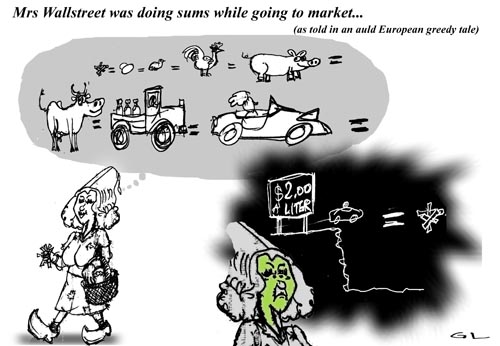Search
Recent comments
- the trick....
6 hours 13 min ago - bibi's wants.....
11 hours 49 min ago - gas snap....
15 hours 9 min ago - challenge....
16 hours 34 min ago - too late....
16 hours 46 min ago - spilling....
18 hours 19 min ago - US bullshit.....
18 hours 27 min ago - ahahahakaka....
19 hours 15 min ago - mel warning....
1 day 9 hours ago - desecration....
1 day 11 hours ago
Democracy Links
Member's Off-site Blogs
fractured fairytales ......

Wall Street suffered its worst losses in more than two months on Friday after crude oil prices spiked over $138, an increase of nearly $11, and the unemployment rate rose more than expected.
All 30 of the stocks that make up the Dow Jones industrials took a hit as the index dropped nearly 400 points on fears that high energy prices will extend and deepen an economic slowdown.
“The market is meeting its worst fears right now,” said Quincy Krosby, chief investment strategist at the Hartford, a financial services firm.
At the close, the Dow was off 3.13 percent, or 394.64 points. The broader Standard & Poor’s 500-stock index fell 43.37 points, or 3 percent, to 1,360.68, its lowest point in four months. The technology-laden Nasdaq composite index declined 75.38 points, or 2.96 percent, to 2,474.56.
Shares opened lower after the government reported that the unemployment rate in May increased the most in one month in 22 years. The decline accelerated as crude oil rose steadily, closing $10.75 higher in its biggest one-day climb ever.
“Oil prices have reached the tipping point,” said Richard Sparks, an analyst at Schaeffer’s Investment Research. “Prices have rallied for a good two months, but now it’s really weighing on the market.”- By Gus Leonisky at 8 Jun 2008 - 7:21pm
- Gus Leonisky's blog
- Login or register to post comments
number crunching
'Number blindness' more common than dyslexia
By Steve Connor, Science Editor
Monday, 9 June 2008
More children suffer from an innate condition that renders them incapable of understanding arithmetic and numbers than those who suffer dyslexia or "word blindness", according to a study of 1,500 school pupils.
The research found that between 3 and 6 per cent of children suffer from dyscalculia – the mathematical equivalent of dyslexia – compared to between 2.5 and 4.3 per cent of children who suffer from its linguistic counterpart.
Brian Butterworth, professor of cognitive neuroscience at University College London, said the disability had nothing to do with how a child was taught, but was the result of children lacking a proper "sense of numbers", which hinders them in maths lessons.
"Increasingly, the evidence shows that dyscalculia is just as common as dyslexia and yet it is not recognised nearly as widely by teachers, parents, schools, local authorities or central government," Professor Butterworth said.
---------------
Gus: As I went through most of my life by faking it, I realised a couple of decades ago that I suffered from a variation of Dyscaculia (I just called it inattention to numbers. I tell my Friends I'm dyslexic with numbers...)
Apart from that, in my own mind I used to inflate the amount of money owed to me and reduce the amount of money I owed people... made my day... My subconscient was deluded sure, but when I did the account I realised that I accidentally was permuting some specific numbers at random. I have worked hard to rectify the problem by slowing down keying stuff in the ledgers and checking several times, before realising that a 345 I wrote down was actually a 354... Not that it makes much difference at the end of the day when one earns peanuts... But I always have had a "sense of numbers", that is to say understanding complex permutations and derivatives, especially on the most important of all: the price of fish.